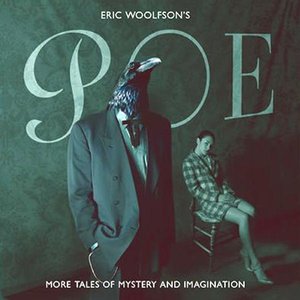
Published on Dec 12, 2003
Thomas Wolfe said you can never go home again. Apparently no one
told this to Eric Woolfson. Good thing, too.
Woolfson, half the central core of the Alan Parsons Project, has
been doing a lot of different things since the Project’s breakup in
1987. He’s done some musicals in Germany and Korea (including the
critically noted
Gambler), written some songs, and spent a lot of time
working with more theatrical music — unlike his counterpart,
Parsons, who has stayed in rock and whose new album is reportedly a
venture into electronica. However, it seems he’s always wanted to
revisit the first subject he ever handled as a musician — the work
of Edgar Allan Poe, the subject of the Project’s 1976 debut.
Finally, Woolfson, working with a new band and vocalist Steve
Balsamo, has released
Poe.
First things first. This is not a Project album — this isn’t
even a progressive rock album. There are elements that are similar,
but Woolfson has spent a decade or more in musical theater, and it
shows. Poe is closer in spirit to
Chess or the work of Tim Rice. That’s actually a good thing;
longtime Project fans know that Woolfson’s commercial-sounding
vocals (on songs like “Time”) helped destroy the Project’s
progressive rock sound through record label pressure. Free of that
preconception, Poe turns out to be a solid, enjoyable, and
well-performed work with very few miscues.
The musicianship is excellent; sometime Project bassist Laurence
Cottle joins a host of new names to put together a stellar
performance. Special kudos have to go to guitarist John Parricelli,
who handles multiple styles with ease and aplomb. Production and
engineering show that Woolfson must have taken notes during all
those years of collaboration; the sound is crisp and clear, no
simple task on harmony-heavy tracks like “Goodbye To All That” and
“The Murders In The Rue Morgue.”
So it seems
Poe rests on the songwriting — and that’s almost perfect. I
confess to not having much of a liking for “Freedom Train,” but
once that’s out of the way, Poe is astonishing. Tracks like “Tiny
Star” and “Wings Of Eagles” are brilliant, “The Pit And The
Pendulum” is appropriately horrible, “Somewhere In The Audience” is
heartbreaking — and the closing track, “Immortal,” may be the
greatest thing Eric Woolfson has ever written. Steve Balsamo’s
soaring celebration of Poe’s literary immortality gave me chills.
Simply beautiful.
Eric Woolfson has come full circle, and gained a good deal of
wisdom and talent along the way. Take the time to dig up a little
Poe — you’ll find it to be a poetically good listen.
[Editor’s Note: Poe can be ordered
here.]